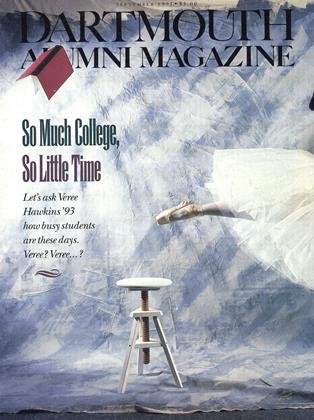FROM STARFISH PUKE TO BEER POLLUTION, A PROF SEES POEMS IN EVOLUTION.
S A HUMAN BEING (kingdom Animalia, phylum Chordata, class Mammalia, order Primates, family Hominidae, genus Homo, species sapiens), Thomas Roos is sui generis. He is very probably the only biologist in living history to have written a short opera to creatures with backbones:
The phylum Chordata has many beasts in it, From pipefish to sea-squirt, from wombat to linnet. What possible features could all have in common To set them apart with a special cognomen?
FROM "OPERA CHORDATA"
He could be the only scientist on this green earth who uses poetry to illustrate scientific principles:
Five stages distinguish the disjunctivedrama
That separates two daughter cells fromone mama. FROM "PHASES"
And he certainly is the only Dartmouth professor of biology who writes his own poetry to teach vocabulary words:
A trochophore larva has multiple rowsOf cilia in front of its mouth with no nose.
- FROM "DISTANT COUSINS"
THIRTY YEARS AGO, EVERYONE KNEW the terms," explains the Dartmouth biology professor. "Now no one does. The depth of ignorance of incoming students is absolutely ludicrous now. You have to begin at the beginning with them. "He knows what students were like 30 years ago because he has been at Dartmouth since 1960. But he didn't start writing classroom poems—didn't feel the need to—until 1978, when he dashed off three stanzas in trochaic hexameter explaining relationships among larvae. Twentysix more poems have followed, some written for classes, some to introduce visitors to campus, some even made up while he lectured. Admiring students in his introductory course for non-biologists, Origins of Life and Species, have set the poems to music and dance. ("I allow considerable leeway on the term paper," Roos notes). Heather McCutchen '87 recalls choreographing a ballet to "Opera Chordata" in which a dancer flung wet peat moss in a blissful rite that was supposed to simulate primordial mud. "Some of the audience, including Professor Roos's wife, got soaked," recalls a rueful McCutchen, who went on after graduation to become a successful playwright.
Roos shrugs when reminded of the story. "It's not as outlandish as you think. Biology can have something to say to people in nonscientific ways." He points out that the dance troupe Pilobolus, founded by biology-religion double major Jonathan Wolken '71, was inspired in part by Wolken's lab work at Dartmouth. Pilobolus is a fungus that grows on dung. "In our hyperprofessional world there's a sense that knowledge can be recalled linearly," says Roos. "The result at age 55 is a functional idiot. Using poetry in biology serves as a cross-reference; it encourages more than one kind of thinkingto me, that's diversity."
Roos is careful to point out that his poems are not great literature ("Sappho will not blush for shame out of my creation". And yet his poetry has taken on a more serious bent over the last few years, slipping from biology to philosophy and back again and using such titles as "Determination" and "As Life Endured the Coming of Executive Control." Roos now reaches back into the primordial slime to experiment with life's impermanence:
Glory, glory evolution,Lacking purpose or conclusion.The order that you see is but anexistential setOf living history.
FROM "As LIFE ENDURED THE COMING OF EXECUTIVE CONTROL"
THE REASON FOR THE POEMS HAS stayed the same, though: to "seduce" students into science. "If more people were more serious in thinking about biology, I think a lot of the twaddle about the environment would go away," he says, turning to an illustrative digression on environmentalists' fight against pollution. "The world would be much poorer without a certain amount of pollution. Wine and beer are nothing but pollution made by yeast. But there's such a thing as too much of a good thing. Yeast kill themselves on too much alcohol. And that's the origin of sherry.
"Tell that to an English faculty at 4:30 in the afternoon!"
Jay Heinrichs
 View Full Issue
View Full Issue
More From This Issue
-
 Feature
FeatureAN EXAM? LET ME TRY TO PENCIL IT IN
September 1991 By JONATHAN DOUGLAS '82 -
 Feature
FeatureThe Gate keeper
September 1991 By Jim Collins '84 -
 Feature
FeatureELECTRIC BODY LANGUAGE
September 1991 By JAY HEINRICHS -
 Article
ArticleDR. WHEELOCK'S JOURNAL
September 1991 By E. Wheelock -
 Article
ArticleAFTER THE WALL
September 1991 By Professor Konrad Kenkel -
 Class Notes
Class Notes1975
September 1991 By W. Blake Winchell
Features
-
 Feature
FeatureWorthington Heads Alumni Council
JULY 1967 -
 Cover Story
Cover StoryMore Than Lived-in
April 1981 -
 Cover Story
Cover StoryThorne Smith 1914
NOVEMBER 1990 -
 Cover Story
Cover StoryA Return to Dartmouth
MAY 1984 By Brian W. Ford '67 -
 Feature
FeatureKnowing Squat About the Woods
MARCH 1997 By Heather Killebrew '89 -
 Feature
FeatureWhitewater Racing
APRIL 1983 By Ted Winterer '79



